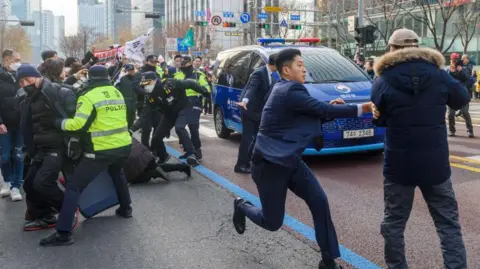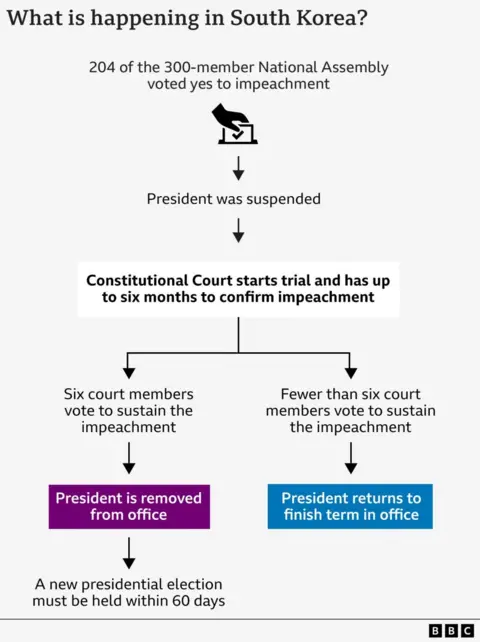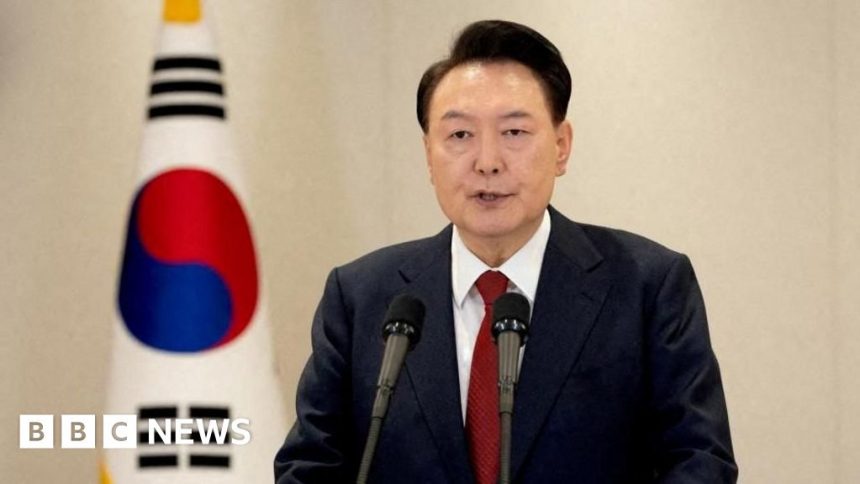South Korean impeached president’s detention extended
 Getty Images
Getty ImagesA court in Seoul has extended the time South Korea’s impeached president Yoon Suk Yeol will be detained over his botched attempt to impose martial law in the country last month.
Citing concerns Yoon could destroy evidence if released, on Sunday a judge issued a warrant allowing investigators to keep the suspended president in custody for up to 20 days.
The 64-year-old was arrested on Wednesday after a weeks-long standoff between investigators and his presidential security team.
Supporters of the president broke into the court after his detention was extended, reportedly smashing windows and doors in an incident condemned by Yoon and the country’s acting president.
The warrant – and Yoon’s subsequent refusal to comply with investigators – is the latest development in a saga that has left South Korea reeling from a political crisis.
The warrant was issued at around 03:00 local time (18:00 GMT on Saturday).
The suspended president is being investigated by the Corruption Investigation Office for High-ranking Officials (CIO) on charges of insurrection over a failed martial law order on 3 December that plunged the country into turmoil.
He has been impeached by parliament and suspended – but will only be removed from office if a constitutional court upholds the impeachment.
Investigators now have 20 days – including the four days Yoon has already spent in custody following his arrest – to bring the president to trial.
After his detention was extended, Yoon’s lawyer, Yun Gap-geun, told the Yonhap News Agency that the president would refuse to be questioned by the CIO.
Pro-Yoon supporters rallied outside the court house in the lead up to the decision, with many entering the building after judges issued the extension.
Journalists at the scene reported seeing dozens of people arrested by police following the incident.
Acting President Choi Sang-mok expressed his “strong regret” over the violence, “which is unimaginable in a democratic society”, adding that authorities would increase security around future appearances.

Choi only recently stepped into the top job after the South Korean parliament voted to impeach the previous acting president, Han Duck-soo, over claims of frustrating Yoon’s impeachment process.
Yoon was “shocked” by the scenes in court, his lawyer said, and called on his supporters to express themselves peacefully, according to local media.
The incident is the latest episode in a series of attempts by Yoon’s supporters to frustrate legal proceedings against the president.
The night before his arrest, hundreds of pro-Yoon protesters camped outside the president’s home and jostled with the police officers attempting to take him into custody.
Similar scenes occurred during an earlier arrest attempt on January 3, where angry pro-Yoon supporters hoping to stop the arrest rallied outside the president’s house.
South Korean police were forced to call off their first arrest attempt after the president’s security team blocked entry to Yoon’s compound.
Public opinion has been divided after Yoon’s shock announcement of martial law last month, which he claimed was due to “anti-state forces” in the South Korean parliament, while mentioning North Korea.
But others have viewed the move as an extreme reaction to the political stalemate that arose after his party’s main opposition won a landslide in April, as well as Yoon’s unpopularity in the wake of a scandal surrounding the First Lady.
Thousands have taken to the streets to demonstrate against the suspended president in the weeks since his ill-fated attempt to impose martial law.







